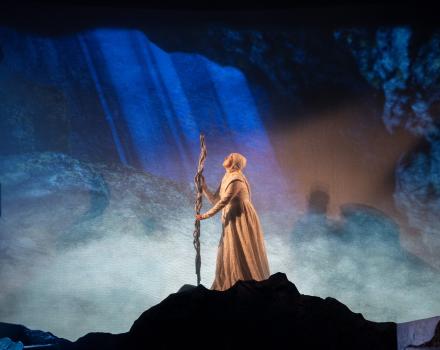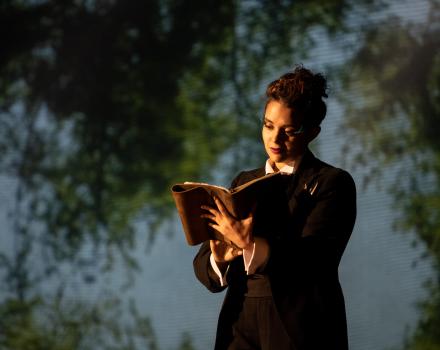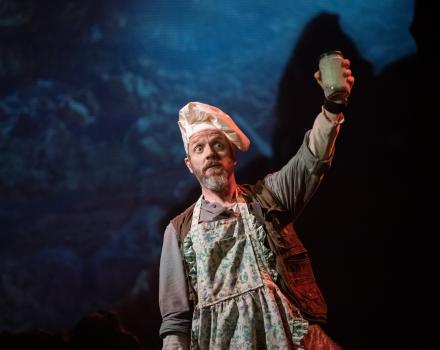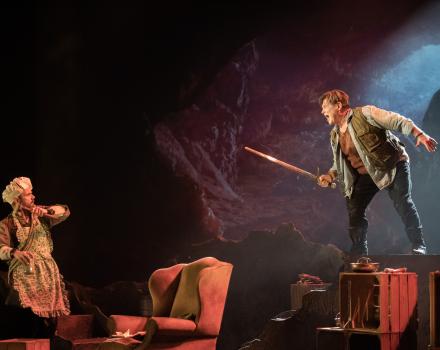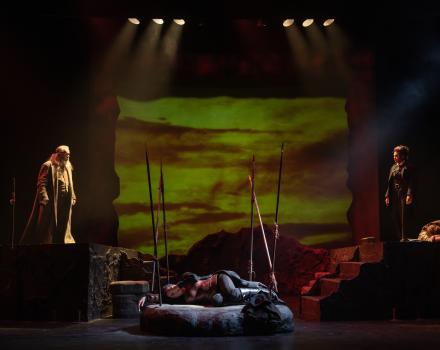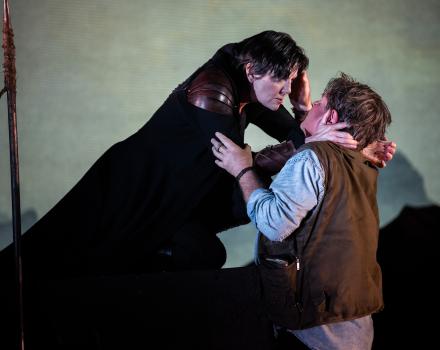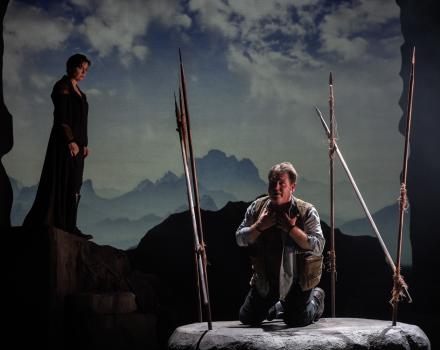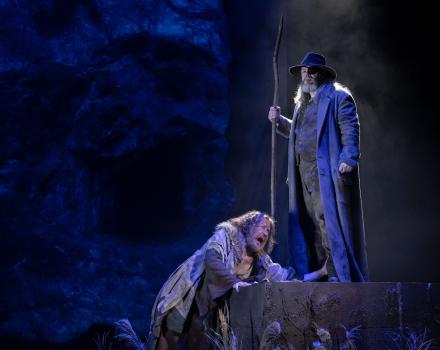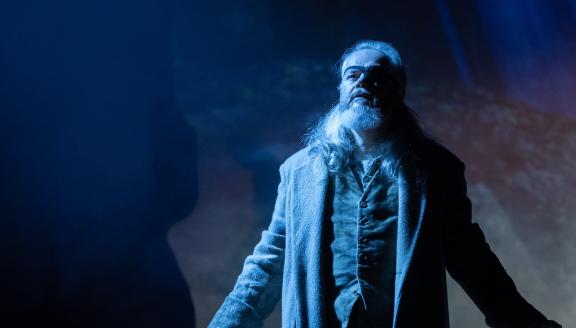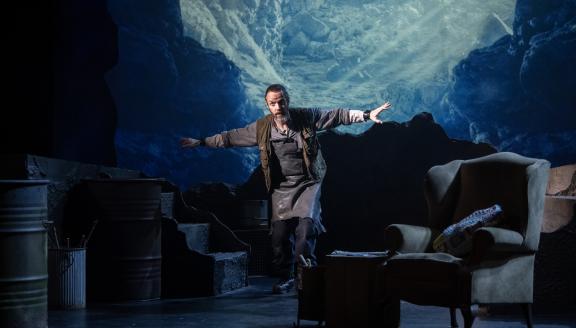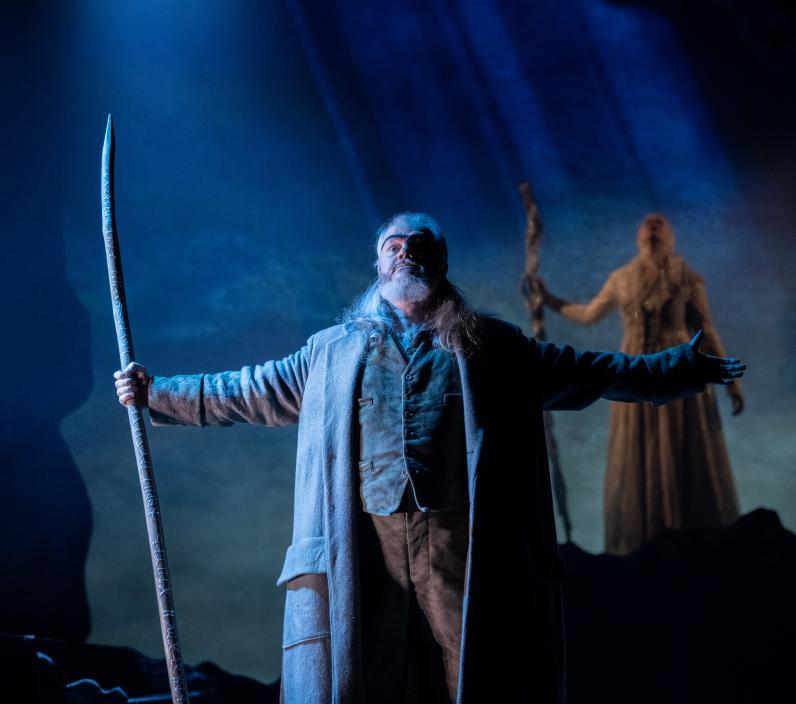
Siegfried

The hero Siegfried reforges his father’s shattered sword, embarking on a quest for the greatest prize of all – the love of the valkyrie Brünnhilde, who lies trapped in a ring of fire.
Siegfried is the third opera in Richard Wagner’s four-opera cycle Der Ring des Nibelungen. Wagner broke off composition at the end of Act II of Siegfried to write Tristan und Isolde and Die Meistersinger von Nürnberg, returning to Siegfried seven years later. Elements of these two operas feed into Siegfried. It features a wonderful celebration of the natural world such as the evocation of the forest in Act II. Like Tristan, it has an ecstatic love duet, as Brünnhilde and Siegfried discover each other. There is also comedy, a quality not typically associated with Wagner. The opera’s lighter moments take many forms, from physical comedy (Mime’s reaction to Siegfried’s superhuman anvil-hammering), character flaws (Mime’s joy at riddle-solving, which almost tips into self-sabotage), and the hero’s revelation of Brünnhilde at the end of the opera (‘That is no man!’) which raises a laugh from audiences in some parts of the world. Longborough Festival Opera, known as the British Bayreuth, calls on renowned Wagnerian Anthony Negus to conduct and Amy Lane to stage this new production of Siegfried in the bucolic English Cotswolds.
CAST
Siegfried | Bradley Daley |
|---|---|
Mime | Adrian Dwyer |
The Wanderer | Paul Carey Jones |
Alberich | Mark Stone |
Fafner | Simon Wilding |
Waldvogel | Julieth Lozano |
Erda | Mae Heydorn |
Brünnhilde | Lee Bisset |
Orchestra | Longborough Festival Orchestra |
| ... | |
Music | Richard Wagner |
|---|---|
Text | Richard Wagner |
Conductor | Anthony Negus |
Director | Amy Lane |
Set and Props Designer | Rhiannon Newman Brown |
Lighting | Charlie Morgan Jones |
Costume designer | Emma Ryott |
Video | Tim Baxter |
Choreographer | Lorena Randi |
Assistant Conductor | Harry Sever |
Assistant Director | Christopher Moon-Little |
Répétiteur | Kelvin Lim |
Language Coach | Dominik Dengler |
Casting | Malcolm Rivers in partnership with The Mastersingers |
Artistic Advisor | Isabel Murphy |
Orchestration | Alfons Abbass version provided by MDS Hire & Copyright |
| ... | |
Videos
THE STORY
ACT I
Siegfried, the son of Siegmund and Sieglinde, has been brought up by his foster-father Mime, brother of Alberich the Nibelung. For Mime, Siegfried is simply the means to kill the dragon Fafner, to gain the Ring for himself. The only weapon powerful enough to kill Fafner is the sword Notung, shattered by Wotan on Siegmund’s death. And Mime is unable to re-forge the sword.
Siegfried’s childhood has been wild, free and fearless, and there is no affection between him and Mime. Siegfried cannot believe that Mime is his true father, and Mime, under duress, is obliged to tell him the truth about his parentage, showing him the fragments of the sword. For Siegfried the sword will be his passport to freedom, and he demands that Mime repair it, and goes out.
An unexpected visitor to Mime’s cave arrives: it is the Wanderer (Wotan in his self-imposed exile from Valhalla). Mime refuses hospitality, and the Wanderer challenges him to a contest of wits: he will answer Mime’s questions, or forfeit his head. But Mime is more inspired by his own intended ingenuity, than with finding out what he really needs to know. Wotan, having answered his questions, turns the tables on him: Mime cannot say who will forge the sword Notung on which his plans depend. The sword, says the Wanderer, will be forged only by one who knows no fear, and Mime’s life will be forfeit to him.
Siegfried returns, and realising that Mime is incapable of forging the sword, he gets on with it himself. Mime, seeing the Wanderer’s prophecy coming true, realises that he is in deep trouble while Siegfried remains fearless. Mime plans to teach Siegfried fear by leading him to Fafner, the most fearful thing he can think of. But here lies another dilemma: if Siegfried is afraid of Fafner, he won’t be able to kill him – how then would Mime get the Ring, without Siegfried unwittingly doing so for him? While Siegfried forges the sword, Mime prepares a poisoned drink with which to tempt Siegfried, after the Ring is won.
ACT II
The Wanderer’s next encounter is with his old adversary Alberich, who has kept an obsessive guard outside Fafner’s cave. Alberich’s desire for power, and his hatred of Wotan, are undiminished.
The Wanderer however, seeing that events are of their own accord going the way he desires them to go, is unperturbed. He goads Alberich by calling up Fafner to warn him of danger; Fafner is sleepy and unimpressed.
Mime brings Siegfried to Fafner’s lair, and leaves him there to await developments. With any luck they will kill each other – if not, then he has a plan in hand.
Siegfried is relaxed – the woods are good to him, and a bird is singing. He imagines it has something to tell him, and tries to understand it; in the process he unwittingly wakes Fafner, who is hungry. Siegfried kills Fafner. As he withdraws the sword from Fafner’s heart the blood spurts over his hand, and he tastes it. Suddenly he can understand the Woodbird, who tells him of the treasure in the cave and then of Mime’s treachery. Siegfried enters the cave, returning later with the Ring and Tarnhelm.
Mime returns to deal with Siegfried. For the first time in his life Siegfried understands his motives clearly and kills him with one deadly blow. The Woodbird now tells Siegfried of a beautiful woman, lying asleep, surrounded by fire. This is Brünnhilde, and he sets off after the bird to find her.
ACT III
The Wanderer’s third encounter is with Erda, mother to his daughter Brünnhilde, whom he wakens from a deep sleep below the earth. He needs her reassurance as to the outcome of the rolling events.
The Wanderer leaves Erda and meets Siegfried on his way up the mountain. Siegfried does not know who he is, and is impatient and aggressive with the old man barring his way. The Wanderer hopes for the young man’s understanding, but is finally coerced into challenging him. Siegfried shatters his spear, leaving the Wanderer broken and powerless.
Siegfried continues through fire to find Brünnhilde. He is overwhelmed by her: the one who knows no fear finally discovering its meaning.
Regaining his composure, he awakens her. Overjoyed to learn that it is Siegfried who has woken her, Brünnhilde soon realises that earthly love means an end to her immortality. She resists – but finally embraces her fate, her new life as a mortal, and a new dawn of hope.
Insights
Siegfried: A new beginning
Writer, librettist and opera dramaturg Sophie Rashbrook speaks to conductor Anthony Negus about humour, colour and willful apprentices in the so-called Scherzo of the Ring.
Die Walküre, the second opera in Richard Wagner’s Ring cycle, ends on top of a mountain, with Wotan, ruler of the gods, encircling his sleeping daughter Brünnhilde with a protective ring of fire, and the words: “Only the one who knows no fear may pass through the flames”.
From those dizzying heights, Siegfried, the next instalment in the saga, picks up the story a generation later, plunging us immediately earthwards, into a new world, whilst simultaneously conjuring memories from the saga’s musical past.
“In this opera,” says conductor Anthony Negus, “there’s always anticipating and looking back – that’s the score of Siegfried all over. The Prelude simply starts with a very low timpani roll, which seems like a throwback to the world of Das Rheingold”. Those who know Das Rheingold, the first opera in Wagner’s four-part mythological saga, will recall its rumbling beginnings: a low E-flat in the double basses that feels as if it is emanating from the centre of the earth. And the Rheingold references don’t end there. “Then we hear a strange motif – a kind of reedy groan – in the bassoons, which we’ve heard before in Scene 3 of Das Rheingold. The whole Prelude feels like a recap of the Rheingold Nibelung music,” says Anthony, referring to the race of dwarves whose actions trigger the events of the entire saga. In its original context, that earthy, moody bassoon theme heralds Mime the dwarf’s description of the terrible crimes his brother, Alberich, committed in pursuit of the Ring’s power. Now, many years later in Siegfried, Mime is still dwelling on the Ring, and his thoughts are turning to the sword he needs to reforge, if he is to claim the stolen jewel. “It’s a very strange beginning,” says Anthony, “but that ‘brooding’ motif becomes all-important and all-pervasive in the opera”.
A strange beginning, perhaps, but it sets the tone – of a subterranean, malevolent, and indeed, male dominated atmosphere – for much of the opera. If handled in the wrong way, this preponderance of murky musical material can make the opera a difficult listen, which brings us to the subject of Siegfried’s dubious status as the least popular of the four Ring cycle operas.
“This is an understandable thing,” says Anthony. “I’ve always thought the problem with Act I is that we have no female voices, and it can become very wearing if the singer playing Mime just sings it all in an ugly way, or as a caricature. I’m sure that’s not what Wagner wanted. It’s much more interesting if the singer playing the role is able to inflect their singing according to the character’s intention – which is, admittedly, mostly malevolent – but it is vital that we constantly hear a differentiation of mood, dynamic and style. This goes for all the singers – but particularly in the case of Mime”.
Another crucial aspect of interpreting Siegfried lies in the balance between the serious and the humorous. Comedy is not a quality typically associated with Wagner, but the opera’s lighter moments take many forms, from physical comedy (Mime’s reaction to Siegfried’s superhuman anvil-hammering), character flaws (Mime’s joy at riddle-solving, which almost tips into self-sabotage), and the hero’s revelation of Brünnhilde at the end of the opera (‘That is no man!’) which always gets a laugh from British audiences – although not, as Anthony points out, in Germany. But for Negus, there is a more sombre, over-arching process at work beneath the laughter – and here he cites the writing of Robert Donington: “The humour underlies the much more interesting process in the opera of the unconscious becoming conscious, and Donington is fascinating on this. Even Siegfried’s reforging of the sword is an important part of him becoming conscious; and becoming a man. But in this opera, all of the characters are on some sort of a journey”.
Siegfried’s initial lack of consciousness is key to his success: as Mime learns, only a hero who knows no fear can reforge the blade, and thus slay Fafner the dragon, guardian of the gold. But when in Act II – following his successful forging of the blade and killing of the monster – Siegfried drinks the dragon’s blood, not only does he become able to understand the song of the Forest Bird, he also experiences a sexual awakening. “The end of that Act is so beautiful and so vital. Until the death of Fafner, there is so much bass in the orchestra – particularly in the contrabass tuba. With the song of the Forest Bird, we hear our first female voice in the opera, and the bass melts away. Suddenly it’s all brightness and light, and it’s such a relief.”
Wotan’s evolution in the piece, as the thinly-disguised Wanderer, is equally fascinating. Compared to the impetuous God we encounter in Die Walküre, the Wanderer is more restrained, and more mature: “In the second scene, he appears with this wonderfully mysterious, numinous motif which we haven’t heard before. It has nobility, and solemnity, and mystery, all in one”. Likewise, Brünnhilde’s trajectory is far from simple. “The music that Siegfried and Brünnhilde sing together is far more complex than being a conventional ‘love duet’. When she wakes, she is not ready yet to succumb to the physical assault that Siegfried represents – and she looks back with regret on what she’s leaving behind. It’s very beautiful and sad”.
The complexity of the couple’s emotional journey is reflected in the orchestral scoring of Act III, which incorporates an additional twelve years of experience on the composer’s part. Wagner finished Acts I and II in 1857, writing Tristan und Isolde and Die Meistersinger von Nürnberg before completing Act III of Siegfried in 1869. “In that act, a whole new atmosphere comes into being: vividly in the marvellous prelude, and we hear it, too, in the scene between the Wanderer and Erda”.
Ultimately, Brünnhilde is carried away by Siegfried’s passion, and the piece ends in a blaze of musical glory, the young hero having defeated the dragon and his manipulative mentor, Mime.
Aptly enough, Siegfried will be the first opera in the current Longborough Ring where Anthony is working closely with his own apprentice: Assistant Conductor Harry Sever, who will be given the opportunity to lead a performance from the podium as Longborough’s inaugural Ring Cycle Conducting Fellow. For Anthony, who first conducted Siegfried in 1985 in a performance for Welsh National Opera, the opera requires careful preparation, not least in terms of stamina.
Recalling that 1985 performance, Anthony says: “It had all been going well, and in the Act III Interlude, I was riding the crest of the wave, when I suddenly realised – rather like Siegfried under the linden tree, that I was exhausted, and I had three quarters of an hour more to go! I got through it, but it taught me about pacing – and I will warn Harry!”. We can only hope that Harry is rather more receptive to advice than Siegfried…
GALLERY
